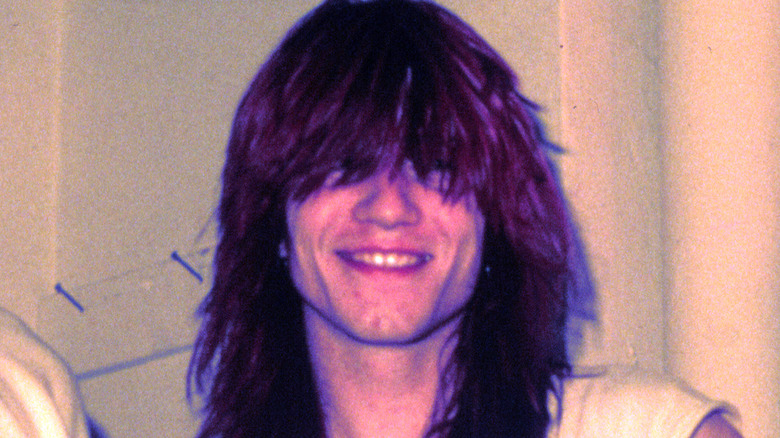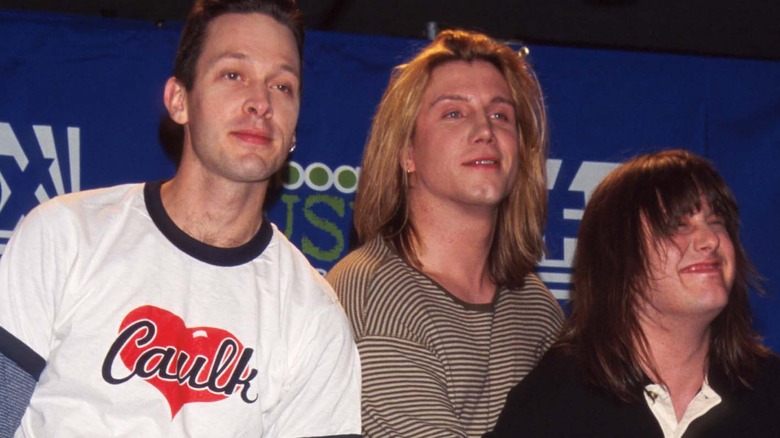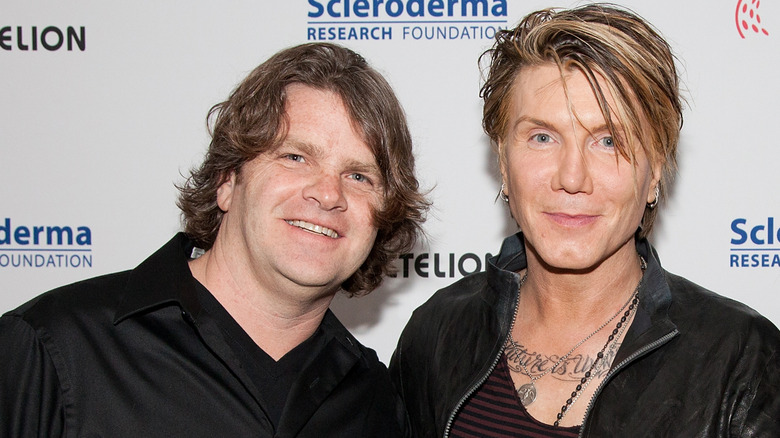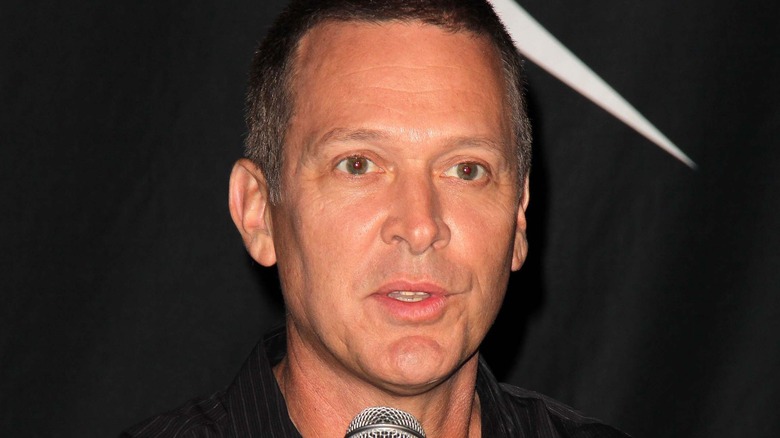The Tragic Real-Life Story Of The Goo Goo Dolls
For more than 25 years now, the Goo Goo Dolls have been a consistent and dominant part of the American audio landscape. Since 1995, with the success of its breakout hit guitar ballad "Name," the Goo Goo Dolls have cranked out one massive radio standard after another, pop-rock favorites and smashes like "Iris," "Slide," "Black Balloon," "Here is Gone," and more. In every permutation a powerful trio that gets a lot of sound out of just a few guys and their instruments, the band formed in Buffalo in the 1980s and toiled for years building a cult following as a melodic punk outfit — reminiscent of peers like the Replacements or Soul Asylum – before finding their sound as the preeminent grown-up rock n' rollers of the '90s and beyond.
Through all the successes, however, the Goo Goo Dolls — alone and together — have experienced and endured all kinds of heartbreak, heartache, turmoil, and trouble. Here's a look at the sadder notes in the story of the Goo Goo Dolls.
The following article contains references to addiction, abuse, and mental health struggles. If you or anyone you know is experiencing these issues, help is available. Contact SAMHSA's National Helpline at 1-800-662-HELP (4357), RAINN's National Helpline at 1-800-656-HOPE (4673), or the National Suicide Prevention Lifeline by calling 1-800-273-TALK (8255).
John Rzeznik had a traumatic upbringing
Future Goo Goo Dolls singer and songwriter John Rzeznik was raised in a large family in Buffalo, New York, and his childhood and teen years were characterized by family dysfunction, rebellion, and crime. Rzeznik's father, Joe Rzeznik, was a hard-drinking postal service worker, per The Buffalo News, and his mother, Edith, was an elementary school teacher. In fact, Rzeznik's second-grade teacher was his mother. "She couldn't help me. I had to get help with my homework from my sisters," Rzeznik said in an interview with The Buffalo News, referring to his four older siblings. "She would definitely let you know when you were wrong," he added. "Smack you when you got out of line."
Rzeznik had a distant relationship with his father, which he believes his mother fostered. According to Us Weekly, when Rzeznik was 11 years old, his parents' marriage had suffered to the point where they got divorced, with Edith Rzeznik citing her husband's excessive drinking and physical abuse as the inciting factors. But Joe Rzeznik didn't go away, still living in the family home in an attached apartment.
That environment led to Rzeznik's teenage rebellion. "I'd get back at my dad through vandalism," he said, explaining that he once spread blacktop fluid across a funeral parlor and often stole money from his father's wallet.
John Rzeznik's father died young
John Rzeznik grew up in Buffalo, New York, son to father Joe Rzeznik, a post office clerk who, according to his son, spent most of his free drinking at bars or being drunk at home. "When he did come home, drunk and depressed, he'd pass out in his chair, or wouldn't even make it that far," Rzeznik told Teen People, recalling an occasion when he, and one of his four sisters, found their father passed out in front of the house, and had to drag him inside and get him into bed.
In addition to the disease of alcoholism, the elder Rzeznik suffered from a host of health problems, including weight issues and diabetes, and when John Rzeznik was a child, his father suffered three heart attacks. Despite those issues, he continued to smoke and drink whiskey heavily. At the age of 55, with John Rzeznik just entering his sophomore year of high school, his father contracted pneumonia, fell into a diabetic coma, and died — leaving behind a wife and five children.
John Rzeznik's mother died young
When his father died in 1981, John Rzeznik didn't think he was in a place where he could process the death. "My sisters were upset," he said of his four siblings, "but I was too angry to grieve," he told Teen People. He'd allow himself to feel the pain and weight of one parent's death when his other parent died. Just a year after the unexpected death of his 55-year-old father, Rzeznik's 53-year-old mother, Edith, died suddenly, too. "She died with me right there in the living room," Rzeznik told Us Weekly.
A frequent smoker with weight issues, Edith Rzeznik officially died as the result of a heart attack, although John Rzeznik believes that the family's difficulty in coping with the loss of Joe Rzeznik led to a lot of stress. "After the old man went, I started to notice a fragile quality in my mom I had never seen before," he said.
At the age of 16 years old, Rzeznik had lost both parents, and the siblings went their separate ways. One sister remained in the family house, two moved out together, and the fourth became John's legal guardian and then set him up alone in an apartment, living off of a small Social Security check allocated to his parents.
John Rzeznik struggled with substance abuse
Goo Goo Dolls singer John Rzeznik, the son of an alcoholic whose extended family members owned a bar, has dealt with addiction issues since he was a teenager, according to The Buffalo News. At the age of 13, Rzeznik's mother used the money his mother gave him for guitar lessons to buy beer. "Three or four nights a week, I would drink beer until I blacked out," Rzeznik told Teen People.
As the Goo Goo Dolls found more fame and success, Rzeznik's drinking and recreational use of pills increased, and he'd frequently drink to the point of passing out. After bandmate Robby Takac quit drinking in 2004, and Rzeznik didn't, it led to a rift in their relationship.
In November 2014, when camped out in a Manhattan hotel room to write songs, Rzeznik drank until he blacked out — and told himself he was ready to die. When he woke up surrounded by broken glass, he called his manager, checked into a rehab facility for three months, and found sobriety.
Success led to divorce for two Goo Goo Dolls
After their commercial breakthrough 1995 album "A Boy Named Goo" sold two million copies (per the RIAA) and generated the hits "Name," "Naked," and "Long Way Down" — and for which the band toured relentlessly (via Concert Archives) for months on end in promotion — its members got a moment to metaphorically breathe, and assess the effects of enormous, global success on their personal lives.
In 1997, per Us Weekly, two out of the three then-members of the Goo Goo Dolls saw their marriages come to an end. First, singer John Rzeznik separated from — and would eventually divorce, according to Teen People – model Laurie Farinacci, to whom he'd been romantically linked since meeting her at a bar in Buffalo in 1988. The marriage lasted three years.
Also in 1997, bassist Robby Takac broke off his marriage to his wife, Tammy, a nurse whom he met through a mutual friend in 1991, and who he wed after "A Boy Named Goo" took off. "I got engaged, married, and divorced on our last tour," Takac said.
The Goo Goo Dolls had to sue their first record label
Before they found fame and fortune as an acoustic-guitar-driven pop-rock and ballads band, the Goo Goo Dolls were a loud, edgy, heavy group with elements of hard rock and punk in their sound. As such, their first five albums (per AllMusic) were released by the first record company to sign them: metal-centric Metal Blade. The Goo Goo Dolls signed their contract with Metal Blade in 1987, according to Rolling Stone, and that's the company who released the band's first smash hit LP in 1995, "A Boy Named Goo."
But by December 1996, after 2.1 million copies had sold and generated numerous hit singles, the members of the Goo Goo Dolls realized they hadn't made anywhere near the fortune those numbers would suggest. According to the band's attorney, research suggested that the group earned $0 in royalties from sales of the album to that point, deriving their income from touring and merchandise sales instead. That lawyer, Peter Paterno, believed the band's initial contract, which they signed back in 1987, was so exploitative and unfair as to be legally void.
According to the Los Angeles Times, it took nine months of legal negotiations for the Goo Goo Dolls to be released from the Metal Blade contract, enabling them to sign a new deal with Warner Bros. Records.
The Goo Goo Dolls' biggest hit was tainted with heartbreak
"Iris" isn't only the Goo Goo Dolls' best-known song and biggest hit, it's one of the most successful songs of all time — for any band. In 1998, it topped the charts for four weeks, and in 2012, Billboard named it the top pop hit of the previous 20 years. The soaring ballad from the soundtrack to the Nicolas Cage romantic supernatural drama "City of Angels" sold seven million copies (per the RIAA) — and made a lot of people feel a lot of feelings, including Goo Goo Dolls lead singer and the song's author, John Rzeznik.
When he wrote "Iris," his personal life had hit a low point. "I was in a really interesting place in my life at that time. I was going through a divorce and I was living in a hotel in California," Rzeznik told PT Sport in 2014. In the 1990s (per Teen People), he met and married model Laurie Farinacci, and the brief marriage — and its dissolution — inspired "Iris." "I was doing a lot of introspective thinking and everything kind of lined up."
A former Goo Goo Dolls drummer sued for wrongful termination
According to AllMusic, the original incarnation of what would become the internationally successful rock band the Goo Goo Dolls, formed in Buffalo, New York, in 1985 under the name the Sex Maggots. For about a decade, the group, under its new name, kept the same lineup: guitarist John Rzeznik, bassist Robby Takac, and drummer George Tutuska. The latter would play on the Goo Goo Dolls' first four independently released albums, and depart after recording his tracks for the blockbuster "A Boy Named Goo."
In 1995, just before "Name" would shoot the band to the top of the charts, Tutuska left the Goo Goo Dolls. According to The Buffalo News, he and lead singer and primary songwriter John Rzeznik had been fighting over money, the band's evolving sound, and who should get songwriting credits.
Tutuska said the squabbles reached such an angry impasse that he was forced to leave the band he'd helped found. "It was tough after the split," he said. "I was 30 years old with nothing. I quit college to stay with this band." In order to get the royalties owed him for his work on the multi-million-selling "A Boy Named Goo," Tutuska had to employ the services of an attorney.
The second Goo Goo Dolls drummer was fired
Following the departure of George Tutuska in 1995, the Goo Goo Dolls brought in a new drummer, Michael Malinin, who sat behind the kit for the band for 18 years, playing on all of the band's subsequent big hits, and providing the rhythm for hundreds of concert gigs, per AllMusic. And then, according to TMZ, the Goo Goo Dolls abruptly fired Malinin in December 2013.
Malinin's wife was pregnant at the time, and the drummer said that he discussed paternity leave with his bandmates, which would kick in right when labor began. But when Malinin's wife was set to deliver in December 2013, the Goo Goo Dolls were on tour — and when the drummer was preparing for his temporary absence, the band's manager fired him instead.
Malinin filed a federal lawsuit citing wrongful disassociation from partnership, according to Courthouse News, seeking some kind of buyout or severance package. In May 2015, and after a series of motions from both sides, Judge Christina A. Snyder of the California Central District Court dismissed the case in its entirety, according to PacerMonitor, meaning Malinin didn't get a settlement.
The Goo Goo Dolls nearly fell apart
After firing original drummer George Tutuska in the mid-'90s (per The Buffalo News) and second drummer Michael Malinin nearly 20 years later (according to TMZ), the only official members of Goo Goo Dolls that remain — as of 2022 — are John Rzeznik and Robby Takac, both original musicians in the band that formed in 1985 (per AllMusic). What was once a trio is now a duo, and it almost amounted to nothing at all.
By 2014, Rzeznik and Takac would still perform together, but their friendship had shriveled to the point where they would no longer interact with one another, or even speak. They both were dealing with so many personal issues that it alienated the other. "I don't think we ever stopped caring about each other," Rzeznik told the Chicago Tribune. "But there were points in time where he was a disaster and I couldn't deal with it, and there were points in time where I was a disaster and he couldn't deal with me."
Rzeznik reached out to Takac for reconciliation in November 2014, shortly after he checked himself into a rehabilitation center to treat his dependency on alcohol. "I apologized for my part of what went wrong in our relationship and he apologized for his part and then it was sort of left behind," he said.
A mass shooting affected the band personally
Buffalo, New York, has produced a number of successful musical acts (according to Ranker), but Goo Goo Dolls are certainly among the most famous and most successful. Original members Robby Takac and John Rzeznik were raised in upstate New York, and still enjoy a strong mutual connection with Buffalo — in 2018, the group played three sold-out shows in its hometown, according to The Buffalo News. As longtime residents, Takac and Rzeznik also share in the collective pain when a tragedy occurs in Buffalo.
According to NPR, 18-year-old Payton S. Gendron allegedly opened fire in a Buffalo supermarket in May 2022. Believed by investigators to be a racially-motivated hate crime, 10 people were killed and three others were seriously injured, with nearly all of those victims being Black.
The mass shooting occurred at an outlet of Tops, a well-known Buffalo chain. "I feel mostly for the community that it's in and the people who live and work and shop in that neighborhood," Rzeznik told ABC Audio. "My biggest hope is that they keep that store open, because that community really needs that," he added, promising the Goo Goo Dolls' involvement in any charitable benefit event for the victims, their families, and the Buffalo neighborhood most hurt by the crime.
John Rzeznik addressed his experiences with domestic violence in a song and video
In 2022, the Goo Goo Dolls made a music video for "You Are the Answer," which wasn't a single. The song is deeply personal to frontman and main band songwriter John Rzeznik, and its commercial appeal was downplayed in favor of its serious message of outreach. "The song is just about being true to yourself and trying to have faith in yourself and go where the love is," Rzeznik told People. "I've been trying to do that for a while because somebody a long time ago said to me, 'Just don't deal with people that are bad for you. Just go where the love is.'"
Filmmaker Keenan O'Reilly then prepared a film treatment for a video, based on what he thought the song meant, and he passed it along to the band. "It just destroyed me inside," Rzeznik said. That video is the story of a woman looking to move on from her past, suffering domestic abuse on the part of her father.
To emphasize that story and those themes, the Goo Goo Dolls taped a bumper for the end of the video advocating Joe Torre Safe at Home, a domestic violence organization aimed at helping children cope and recover from abuse. "I grew up in a house where there was some domestic violence and alcoholism and when I found out about the Joe Torre Safe at Home organization, I just was instantly moved," Rzeznik said.












